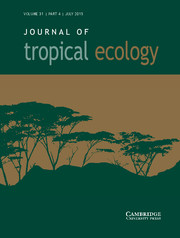Crossref Citations
This article has been cited by the following publications. This list is generated based on data provided by
Crossref.
Vanpé, Cécile
Salmona, Jordi
Pais, Isa
Kun‐Rodrigues, Célia
Pichon, Claire
Meyler, Samuel Viana
Rabarivola, Clément
Lewis, Rebecca J.
Ibouroi, Mohamed Thani
and
Chikhi, Lounès
2013.
Noninvasive molecular sexing: An evaluation and validation of the SRY‐ and amelogenin‐based method in three new lemur species.
American Journal of Physical Anthropology,
Vol. 150,
Issue. 3,
p.
492.
Volampeno, M. Sylviane N.
Randriatahina, Guy
and
Downs, Colleen T.
2013.
Structure and Composition of Ankarafa Forest, Sahamalaza-Iles Radama National Park, Madagascar: Implications for the Frugivorous Endemic Blue-Eyed Black Lemur (Eulemur flavifrons).
South African Journal of Wildlife Research,
Vol. 43,
Issue. 2,
p.
91.
Pichon, Claire
and
Simmen, Bruno
2015.
Energy management in crowned sifakas (Propithecus coronatus) and the timing of reproduction in a seasonal environment.
American Journal of Physical Anthropology,
Vol. 158,
Issue. 2,
p.
269.
Ameca y Juárez, Eric I.
Ellis, Edward A.
and
Rodríguez‐Luna, Ernesto
2015.
Quantifying the severity of hurricanes on extinction probabilities of a primate population: Insights into “Island” extirpations.
American Journal of Primatology,
Vol. 77,
Issue. 7,
p.
786.
Pavelka, Mary
and
Behie, Alison
2017.
The International Encyclopedia of Primatology.
p.
1.
Leimberger, Kara G.
and
Lewis, Rebecca J.
2017.
Patterns of male dispersal in Verreaux's sifaka (Propithecus verreauxi) at Kirindy Mitea National Park.
American Journal of Primatology,
Vol. 79,
Issue. 7,
Fardi, Sara
Sauther, Michelle. L.
Cuozzo, Frank P.
Jacky, Ibrahim A. Y.
and
Bernstein, Robin M.
2018.
The effect of extreme weather events on hair cortisol and body weight in a wild ring‐tailed lemur population (Lemur catta) in southwestern Madagascar.
American Journal of Primatology,
Vol. 80,
Issue. 2,
Scanlon, Annette T.
Petit, Sophie
Tuiwawa, Marika
and
Naikatini, Alivereti
2018.
Response of primary and secondary rainforest flowers and fruits to a cyclone, and implications for plant‐servicing bats.
Global Change Biology,
Vol. 24,
Issue. 8,
p.
3820.
Miller, Alex
Mills, Harriet
Ralantoharijaona, Tantely
Volasoa, Nicole Andriaholinirina
Misandeau, Chantal
Chikhi, Lounès
Bencini, Roberta
and
Salmona, Jordi
2018.
Forest Type Influences Population Densities of Nocturnal Lemurs in Manompana, Northeastern Madagascar.
International Journal of Primatology,
Vol. 39,
Issue. 4,
p.
646.
Voyt, Rachel A.
Sandel, Aaron A.
Ortiz, Kathryn M.
and
Lewis, Rebecca J.
2019.
Female Power in Verreaux’s Sifaka (Propithecus verreauxi) Is Based on Maturity, Not Body Size.
International Journal of Primatology,
Vol. 40,
Issue. 3,
p.
417.
Behie, Alison M.
Teichroeb, Julie A.
and
Malone, Nicholas
2019.
Primate Research and Conservation in the Anthropocene.
p.
1.
Mellor, Emma L.
Cuthill, Innes C.
Schwitzer, Christoph
Mason, Georgia J.
and
Mendl, Michael
2020.
Large Lemurs: Ecological, Demographic and Environmental Risk Factors for Weight Gain in Captivity.
Animals,
Vol. 10,
Issue. 8,
p.
1443.
Dinsmore, Mary P.
Strier, Karen B.
and
Louis, Edward E.
2021.
The influence of seasonality, anthropogenic disturbances, and cyclonic activity on the behavior of northern sportive lemurs (Lepilemur septentrionalis) at Montagne des Français, Madagascar.
American Journal of Primatology,
Vol. 83,
Issue. 12,
Radespiel, Ute
Rakotondravony, Romule
Rasoloharijaona, Solofonirina
and
Randrianambinina, Blanchard
2022.
A 24-Year Record of Female Reproductive Dynamics in Two Sympatric Mouse Lemur Species in Northwestern Madagascar.
International Journal of Primatology,
Vol. 43,
Issue. 4,
p.
559.
Ameca, Eric I.
Chamart, Lucy
and
Garber, Paul A.
2023.
A conceptual framework for assessing behavioral flexibility of species in response to extreme climatic events.
Scientific Reports,
Vol. 13,
Issue. 1,
Paige, Leslie A.
Santini, Luca
Rasamisoa, Delaid C.
Andriamahaihavana, Antonin
Ganzhorn, Jörg U.
Gibson, Dean
Owen, Megan A.
Razafindramanana, Josia
Vasey, Natalie
Donati, Giuseppe
and
Eppley, Timothy M.
2024.
Weathering the storm: Long‐term implications on the feeding ecology and habitat use of a frugivorous lemur following a tropical cyclone.
Biotropica,
Vol. 56,
Issue. 6,
Veilleux, Carrie C.
Tecot, Stacey R.
and
Lewis, Rebecca J.
2024.
Fat storage and drought tolerance in a seasonally‐adapted primate: Implications for modeling the effects of animal responses to global climate change.
Integrative Conservation,
Axel, Anne C.
Harshbarger, Brynn M.
Lewis, Rebecca J.
and
Tecot, Stacey R.
2024.
Consistency in Verreaux's sifaka home range and core area size despite seasonal variation in resource availability as assessed by Enhanced Vegetation Index (EVI).
American Journal of Primatology,
Vol. 86,
Issue. 6,


